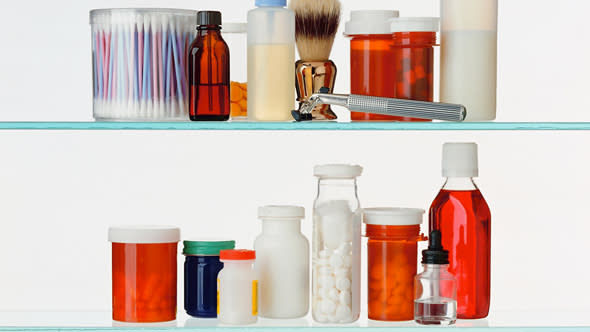Medicine cabinet essentials

Pic: Getty
Whether you're suddenly struck down with a winter lurgy or have an accident-prone family member, a well-stocked medicine cabinet is a must. There's no need to fill up with every remedy under the sun but there are some essentials you should always keep handy.
Related Searches
Aches and pains
A simple over-the-counter painkiller can ease the symptoms of everything from headaches to sprains. Paracetamol is safe, readily available and will take the majority of pains away, but ibuprofen is also advisable. Though it's not recommended for those with stomach problems or asthma, this anti-inflammatory can help with both pain and fever. If you have kids in the house, Calpol (paracetamol) or an ibuprofen suspension for children is a useful item to stock.
The above pain medication should also help to ease the symptoms of cold or flu when combined with plenty of fluids and rest, so there's really no need to bother with specialist flu remedies, though throat lozenges that contain a local anaesthetic will help with a sore throat.
Itches and allergies
They might not be troubling you during the depths of winter, but unexpected rashes, allergies or insect bites can be readily treated with the right medication. Creams designed specifically for insect bites, such as Anthisan, can ease the itching for young and old, while hydrocortisone cream, available in high street pharmacies, is great for dry, scaly skin that moisturiser won't relieve. If you or a family member are prone to hayfever, an antihistamine that contains chlorphenamine can ease the symptoms.
Tummy troubles
Indigestion can be extremely uncomfortable, and it's caused by acid coming up from your stomach. For those prone to tummy troubles, a ready supply of anti-acid medicine is an essential. Products such as Gaviscon come in both liquid and tablet form, and help to neutralise the acid, thereby easing your symptoms. Alternatively, go for the cheaper Ranitidine, which is available at supermarket pharmacy counters.
Where a nasty bug involving diarrhoea or vomiting has bitten, hydration is key to recovery, so investing in oral rehydration salts (soluble in water) should be used for both adults and children.
Simple first aid
Minor cuts and grazes are a regular occurrence if you have kids at home, so a simple first aid kit is a must. But don't bother forking out for a fancy all-singing, all-dancing kit - a few little bits can solve most minor problems. Sticky plasters are perfect for small wounds, while sterile gauze and micropure tape for fastening will keep a cut clean and covered while it heals. For small open wounds, skin closures (thin sticky strips of tape) can be used to bring the skin together, and all are readily available from high street pharmacies. Just make sure you clean any cut or graze with salty water before applying a dressing.
%VIRTUAL-AFCSponserAds%
Temperature gauge
Especially important for those with young children, having a thermometer at home will give parents peace of mind. Most reliable are the digital thermometers, which cost in the region of £3.99, and give you an accurate reading and enable you to quickly recognise when a fever might be a problem. However, fever scan strips that are placed on the forehead are another alternative, and are useful for wriggly children. They cost around the £3 mark from high street pharmacies.
What do you consider medicine cabinet essentials? Leave your comments below...



